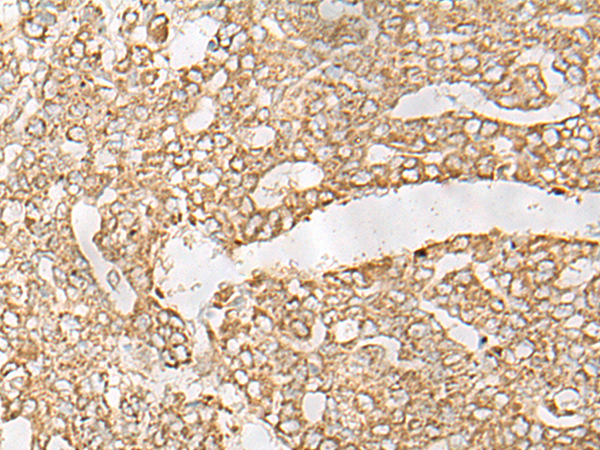
| WB | 咨询技术 | Human,Mouse,Rat |
| IF | 咨询技术 | Human,Mouse,Rat |
| IHC | 1/25-1/100 | Human,Mouse,Rat |
| ICC | 技术咨询 | Human,Mouse,Rat |
| FCM | 咨询技术 | Human,Mouse,Rat |
| Elisa | 1/5000-1/10000 | Human,Mouse,Rat |
| Aliases | CYT19 |
| Host/Isotype | Rabbit IgG |
| Antibody Type | Primary antibody |
| Storage | Store at 4°C short term. Aliquot and store at -20°C long term. Avoid freeze/thaw cycles. |
| Species Reactivity | Human, Mouse, Rat |
| Immunogen | Synthetic peptide of human AS3MT |
| Formulation | Purified antibody in PBS with 0.05% sodium azide and 50% glycerol. |
+ +
以下是关于AS3MT抗体的3篇参考文献的简要信息,涵盖其在砷代谢、组织定位及疾病关联中的研究:
1. **文献名称**:*"Genetic variation in AS3MT and arsenic methylation in relation to arsenic-induced premalignant skin lesions"*
**作者**:Lindberg AL et al.
**摘要**:通过检测人群血液中AS3MT蛋白表达(使用特异性抗体),发现AS3MT基因多态性与砷甲基化效率及皮肤癌前病变风险显著相关,支持其在砷代谢中的关键作用。
2. **文献名称**:*"Tissue-specific expression of arsenic methyltransferase (AS3MT) in mammalian systems"*
**作者**:Drobna Z et al.
**摘要**:利用AS3MT抗体进行免疫印迹和免疫组化,证实AS3MT在肝脏和肾脏中高表达,而在脑组织中表达较低,提示其器官特异性砷解毒功能。
3. **文献名称**:*"AS3MT-mediated arsenic metabolism triggers hepatic lipid accumulation via transcriptional regulation of lipid transporters"*
**作者**:Li J et al.
**摘要**:通过抑制AS3MT(抗体验证蛋白敲低)发现砷暴露导致脂质代谢异常,揭示AS3MT通过调节脂质转运蛋白影响肝脏脂肪沉积的分子机制。
这些研究均依赖AS3MT抗体进行蛋白水平分析,涉及人群流行病学、组织定位及代谢机制探索。
The arsenic (+3 oxidation state) methyltransferase (AS3MT) antibody is a crucial tool in studying the enzyme responsible for arsenic biotransformation in humans. AS3MT catalyzes the methylation of inorganic arsenic, converting toxic arsenite (As³⁺) into mono- and di-methylated metabolites, which are excreted or accumulate in tissues. This enzymatic process influences arsenic toxicity and carcinogenicity, as methylated intermediates may exhibit varying biological effects.
AS3MT antibodies are widely used in biomedical research to detect AS3MT expression levels, localization, and regulation in tissues, particularly in the liver and kidneys. They enable investigations into genetic polymorphisms affecting arsenic metabolism efficiency and associated disease risks, such as cancer or cardiovascular disorders. These antibodies are essential for techniques like Western blotting, immunohistochemistry, and ELISA, helping elucidate mechanisms of arsenic detoxification, epigenetic interactions, and interindividual susceptibility variations.
Developed against specific epitopes (e.g., human AS3MT N-terminal or full-length protein), commercial AS3MT antibodies are validated for cross-reactivity across species, including rodents, aiding translational studies. Research using these antibodies has highlighted AS3MT's role not only in arsenic metabolism but also in modulating cellular redox balance and one-carbon metabolism. Their application advances understanding of environmental toxicology, personalized medicine, and public health strategies in arsenic-exposed populations.
×